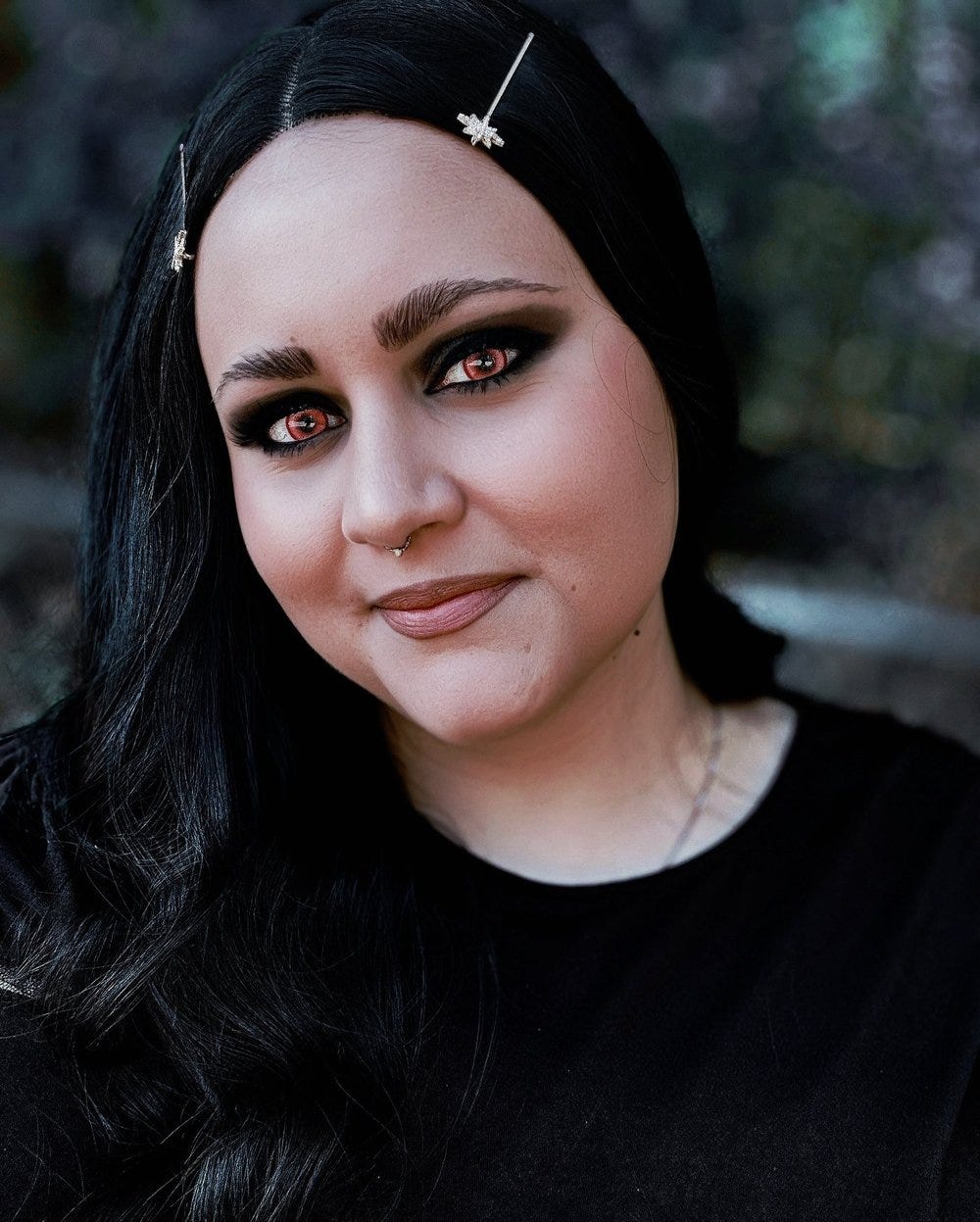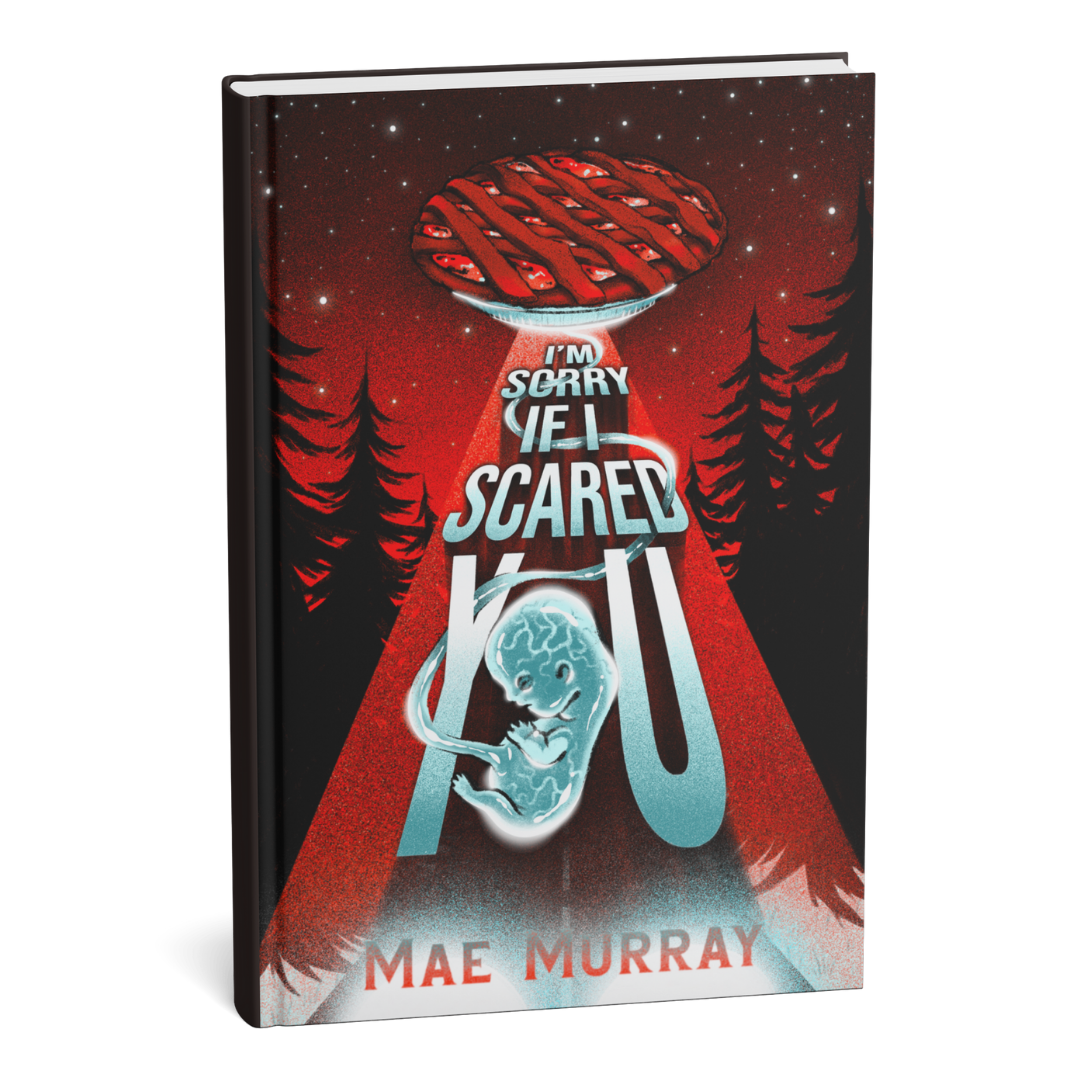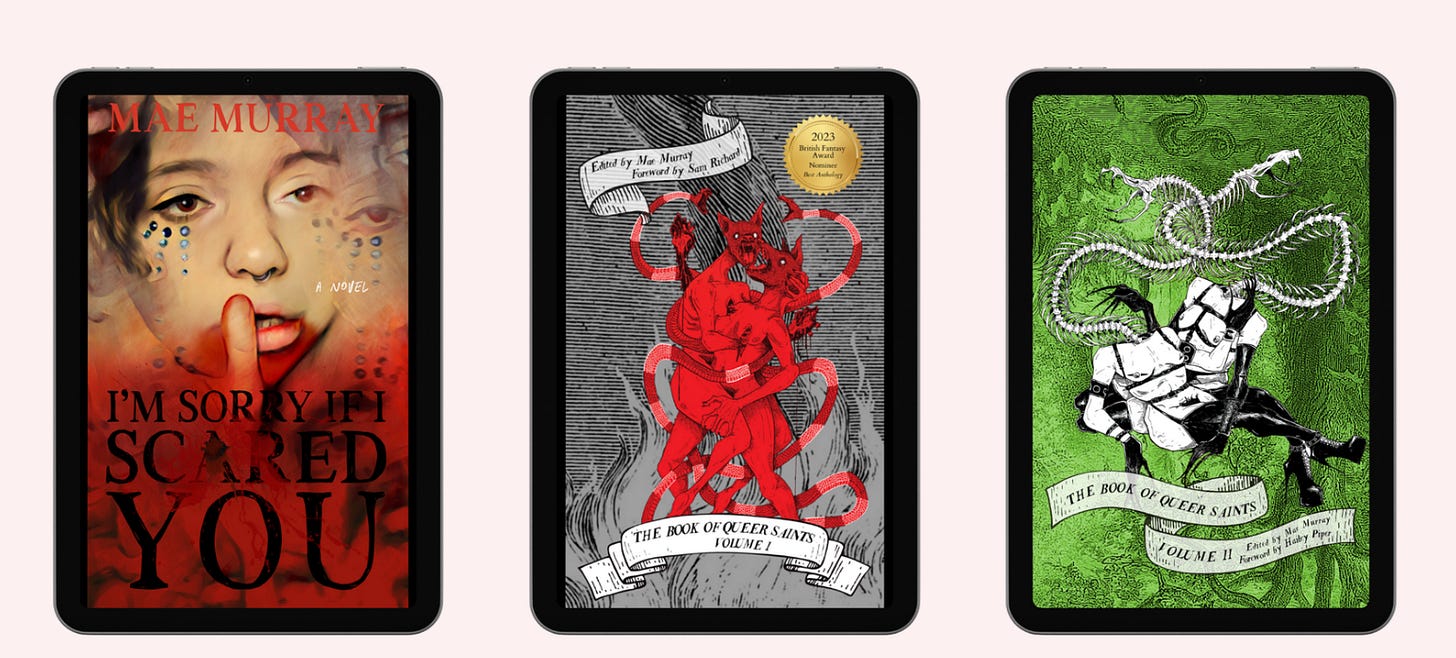For #5 in this series of interviews for Women in Horror Month 2025, our guest is Mae Murray. Thank you for doing the interview, Mae!
Thank you so much for having me, Christi! I’m a big fan, both of your work and of you as a person, so this is an honor.

I recently read your debut novel I’m Sorry If I Scared You–very powerful! I’m going to have a few questions about this novel.
Oh gosh, thank you!

This novel struck me as unique in the way realism and fantasy were juxtaposed. Certain elements were so lifelike, such as the characters, relationships, and setting. Other elements were, in the words of some of the reviewers, very “weird” and “WTF.” I was curious if that contrast was something you had in mind from the beginning, or if it developed over time.
I think there is a tendency, when a work of fiction goes off the rails, to assume that it was a mistake on the part of the writer, that there was no craft or intention in it. It happens more with horror than with anything—people tend to like their stories a little more straight-forward, even when speculative elements are involved. I love weird horror because there isn’t as much pressure to do that, but it’s also kind of a scrappy place to be, where only a handful of us (seriously, like I can count on one hand) ever get to be traditionally published or really succeed in traditional ways.
I knew before I wrote the book that it would be weird, and it was very much intentional to have a sharp contrast between the real and the speculative. This is the first time I’ve really gotten to talk about the book, so pardon me if I’m a little long-winded, but a major theme of I’m Sorry If I Scared You is the helplessness of poverty, and how people living in poverty, in areas where violence is normalized, a kind of dog-eat-dog survival, become ultra-desensitized to the horror of everyday life.
I’ve also described the book to my friends as the closest thing to an autobiography I’ll ever write. I’m writing about a place I know so well—rural Arkansas—and the people who live there. The biggest challenge of the realistic elements was to decide how real I wanted to get with it.
The novel has so many different genre elements–eroticism, revenge fantasy, body horror, and more. I was also curious how these developed as you wrote it.
It was always going to be a revenge fantasy. The final scene, with the pie, was the birthplace of the entire novel. I’m a survivor of sexual assault, and there are so many unresolved feelings I have about that, and about the violence of my upbringing, that I have to contend with. I’ve heard that the first novel is often the most personal, so I suppose that is true with me. It’s not just a revenge fantasy; in a lot of ways, it’s my revenge fantasy.
I actually started developing the idea during a call for holiday horror stories edited by Gabino Iglesias back in 2021, which is why it takes place between Thanksgiving and Christmas. At the time, Roe v Wade was being threatened, and so the right to abortion was on my mind, and I started to realize this was going to be bigger than a short story. I grew up with abstinence-only education in a deeply conservative environment. Abortion has, against my will, always conjured images of body horror because growing up I saw billboards with chopped up embryonic fetuses— little dismembered heads and arms and legs—on the highway. So abortion just became synonymous with that, and I feared it a lot as a kid. And that fear stays with you, even with logic, intelligence, and time.
As for the eroticism, I actually worried a lot about that. Queer horror with even a hint of erotic elements often gets lumped into Erotica or pornography. I remember when The Book of Queer Saints Volume I came out, it was ranking high on Amazon’s LGBTQ Erotica list, and I was really puzzled by that. It had sex in it, but I didn’t think of it as Erotica. I like to write real, dirty, messy, awkward sex, and the sex element was important to Odie’s story, because it’s not just a revenge fantasy, it’s, in a lot of ways, a romance, and about young queer people learning how to love and discovering where friendship ends and a romantic relationship begins. In a story about letting go of your inhibitions and giving into what you truly want, the erotic element came naturally.
Odie, her family, and her friends are great characters. Do you imagine writing about them again in another book?
I like the idea of it. It left off in a place where the potential could be there for sure, and I’ve even flirted with ideas for a follow up. But we’ll see.
What does the title refer to?
Have you ever felt the need to scream? A high-pitched, terrified, full-body violent earthquake of a cry, clawing its way out of you, from desperation, from urgency, coming from a place you didn’t know existed? The kind of scream that stays with you for years after it’s left your throat. I suppose the title imagines what would be said after one let out such a scream.
I notice that you have a 2022 Brave New Weird Award for Superior Achievement in Short Fiction. What story was that, and what are some other stories that you’d most like readers to check out if they’re new to your work?
I’m so ridiculously proud of that story and that award! It was for “The Imperfection,” which I wrote for Shortwave Magazine. If I had to choose a story, I’d probably choose that one. I also have a free-to-read story, “Scales Fell From Her Eyes,” on my website.
I really appreciate your series of Women in Horror Month interviews on your blog, as well as the promotion of them that you’ve done on social media, which highlights interviewees’ statements about feeling marginalized and promoting marginalized creators. Would you like to say what Women in Horror Month means to you?
I’ve thought about this question a lot over the past month. I’ve learned so much from the women I’ve interviewed; even women I feel like I’ve known a long time, I continue to be overwhelmed by how incredibly insightful they are, how much they have to offer as thinkers, leaders, and experts in their craft.
It feels like the kind of thing that should be a celebration, but is really a reminder of how much labor women in our profession must do just to be seen and heard. All of the ongoing Women in Horror Month initiatives I’ve seen this year have been run by women. I think men in our profession, especially those with huge platforms who purport to be passionate about equality and social justice, should really be taking the initiative in promoting diverse women.
What’s next for you as a writer?
A couple of things I can’t talk about yet, a vampire novel, and a grief horror novella—all in early stages. I wish I could be as prolific as some of my contemporaries, but the truth is, I’m a slow writer with a day job and a chronic illness (lupus), so everything takes longer than I’d like!
I think you might be the only writer I interviewed for this WiHM who is also an editor, with The Book of Queer Saints: Volume I and The Book of Queer Saints: Volume II. What’s next for you as an editor?
I’ve taken a step back from editing in favor of focusing on getting better at my craft. I genuinely loved putting out those anthologies, getting to know so many up-and-coming and established writers, and kind of creating a little family. Every now and then, I get a question about whether there will be a third Queer Saints anthology. I suppose I can answer that here: Never say never, just not yet.
What is a question you wish I had asked? Ask and answer (please).
I love this question. One thing I wish I got to talk about more is what it’s like being a writer with a chronic illness/physical disability. I live with lupus, and am on several immunosuppressants including weekly oral chemotherapy and injections to keep the symptoms manageable. I wish I got to talk more about how much it impacts my writing, particularly how it impacted the timeline of my novel, which came out over a year after it was originally supposed to be released. Of course, there were other factors that contributed to that, like a death in the family, but how often I get ill because of my battle with lupus was a major one. It takes a lot of fortitude to be a writer living with an incurable illness that impacts daily life. I find that we have started to do a much better job as a genre, talking about living with mental illness and neurodivergence. But we hardly ever talk about physical disability in a meaningful way, and I spend a lot of time thinking about how we can change that.
Thank you so much for being interviewed, Mae!
Thank you so much for having me, Christi! It’s been a privilege.

As always in Noglesque, I will end with some of my own stuff:
I was recently interviewed on Mae Murray’s blog
I’ll be participating in Storyfort (literary events accompanying the Treefort Music Festival): Event Page
Sawtooth Screams: Idaho Authors Tell Their Haunting Tales
Wed, Mar 26 3:00 pm - 5:00 pm
Ochos
Join four of Idaho's best macabre authors as they read some of their most spine-tingling work, followed by an honest conversation about what it takes to craft such uncanny and haunting stories.
Alison Ames, Alexis Kester, Alice Thompson, Christi NogleI have a new newsletter on Creativity & Inspiration
My newest updates are always at https://linktr.ee/christinogle
My novel Beulah is available at Amazon, and my other books should be available at any online seller:





“All of the ongoing Women in Horror Month initiatives I’ve seen this year have been run by women.” —- WOW. That just hit me so, so hard. You’re 100% right. That … I’m going to have to process that.
Just noting this is #5 in my series, sorry for the mistake! 1 more to come on March 31!